Have you ever noticed a white, chalky residue on your faucets or showerheads? Or perhaps experienced dry skin and dull hair even after a good wash?
These are common signs of hard water, which contains high levels of minerals like calcium and magnesium.
To combat the problems caused by hard water, many households turn to water softeners.
But, exactly what is a water softener and what does it do?
In this guide, we will explore these answers, along with how they work, their benefits, installation, and maintenance.
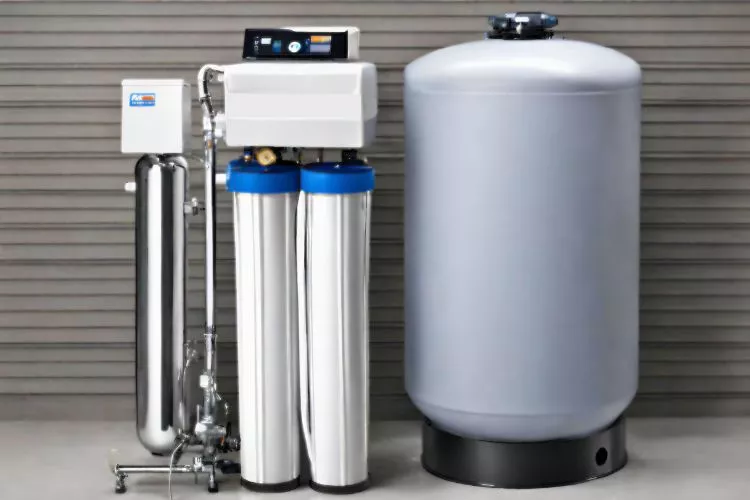
💦 What is a Water Softener?
A water softener is a device that is designed to remove minerals such as calcium and magnesium from hard water, making it soft.
The softening process involves a technique known as ion exchange, where the hard water flows through a resin tank containing tiny resin beads.
These beads attract and remove the minerals responsible for water hardness, replacing them with sodium ions.
💦 How Water Softeners Work?
The Process of Water Softening
The process of water softening involves several steps to convert hard water into soft water:
When hard water enters the water softener system, it passes through a resin tank containing resin beads. These beads are typically made of polystyrene, coated with a sodium solution.
As the hard water flows over the resin beads, the calcium and magnesium ions in the water are attracted to the resin beads, while the sodium ions are released into the water.
The calcium and magnesium ions are trapped on the resin beads, effectively removing them from the water and making it soft.
Ion Exchange and Its Role in Water Softening
The key principle behind water softening is ion exchange. The resin beads in the water softener system are negatively charged, while the calcium and magnesium ions in hard water have a positive charge.
The attraction between opposite charges allows the resin beads to capture the hardness-causing minerals and replace them with sodium ions.
Removing Hardness-Causing Minerals
By removing the hardness-causing minerals, water softeners prevent the formation of limescale deposits on surfaces like faucets, showers, and appliances.
Limescale not only looks unsightly but can also cause damage to plumbing systems, decrease energy efficiency, and affect the lifespan of appliances like dishwashers and washing machines.
💦 Benefits of Using a Water Softener
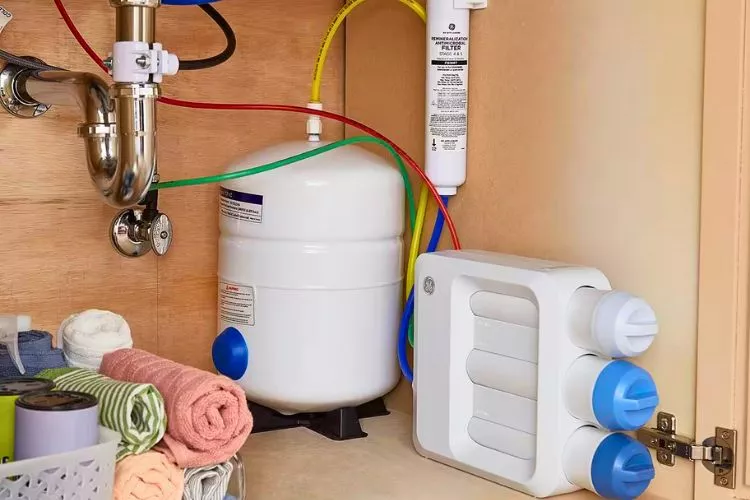
Health Benefits of Soft Water
Soft water has several health benefits over hard water. It is gentler on the skin and hair, reducing dryness and irritation.
Soft water also allows soaps and shampoos to lather more effectively, leading to a more thorough clean. Additionally, soft water can help alleviate symptoms of skin conditions like eczema and psoriasis.
Protecting Plumbing and Appliances
One of the main advantages of using a water softener is the protection it provides to plumbing systems and appliances.
By preventing the accumulation of limescale, water softeners help extend the lifespan of pipes, faucets, water heaters, and other appliances that come into contact with water.
This not only saves money on costly repairs and replacements but also ensures optimal performance.
Improving the Effectiveness of Soaps and Detergents
Hard water can inhibit the effectiveness of soaps, detergents, and cleaning products. When used with hard water, these products often leave behind residues, making it harder to clean dishes, clothes, and surfaces properly.
By softening the water, a water softener improves the lathering and cleaning capabilities of various products, resulting in cleaner and brighter laundry, spotless dishes, and cleaner surfaces.
💦 Different Types of Water Softeners
Salt-Based Water Softeners
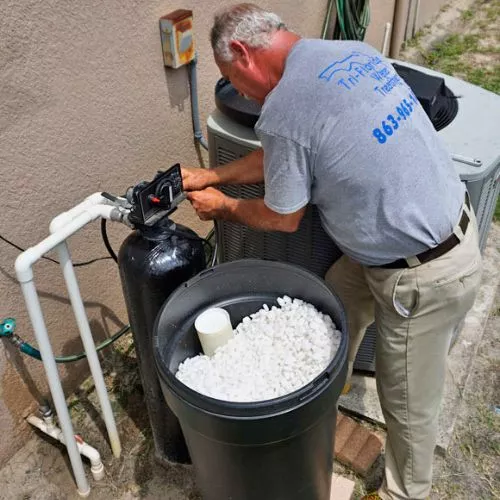
Salt-based water softeners are the most common type of water softeners.
They use a brine tank that periodically regenerates the resin beads by flushing them with a highly concentrated salt solution.
This process removes the accumulated calcium and magnesium ions from the resin beads, ensuring the water softener can continue to provide soft water.
Salt-Free Water Conditioners
Salt-free water conditioners, also known as descalers, work by altering the structure of hardness minerals in the water through a chemical process called template-assisted crystallization.
They do not remove the minerals from the water, but instead prevent them from forming limescale deposits on surfaces.
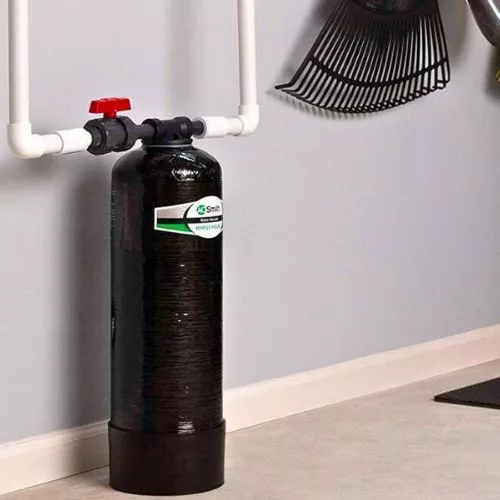
Dual-Tank Water Softeners
Dual-tank water softeners are designed for larger households with higher water consumption. Unlike traditional single-tank water softeners, dual-tank systems have two resin tanks.
While one tank is in use, the other goes through the regeneration process, ensuring a constant supply of soft water without interruption.
💦 Water Softener Installation and Maintenance
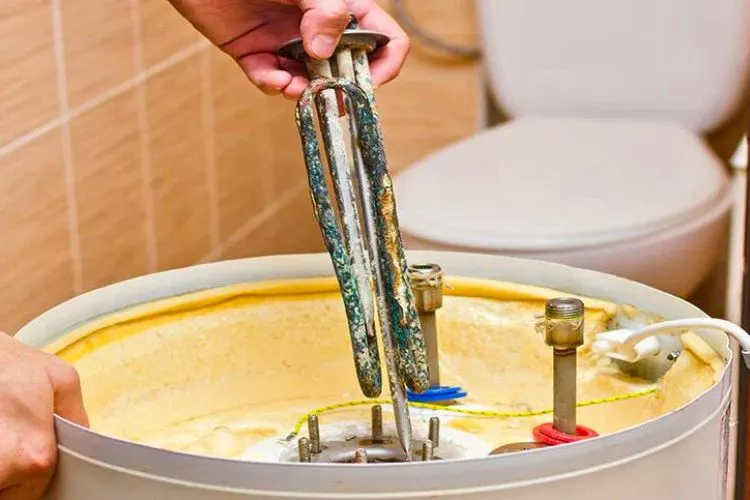
Installing a Water Softener System
The installation of a water softener system usually involves the following steps:
- Conduct a water test to determine the level of hardness in the water and choose an appropriately sized water softener system.
- Find a suitable location near the main water supply line where the water softener can be installed, typically in a basement or utility room.
- Connect the water softener to the main water supply line, ensuring proper flow direction.
- Install a bypass valve to allow for maintenance and emergency situations.
- Add the required amount of salt or potassium chloride to the brine tank for salt-based systems.
Maintenance Tips to Prolong the Lifespan of a Water Softener
To ensure the longevity and optimal performance of your water softener, consider the following maintenance tips:
- Regularly check the salt levels in the brine tank and replenish as necessary for salt-based systems.
- Clean and inspect the resin tank annually to remove any built-up sediment or debris.
- Follow the manufacturer’s instructions for recommended maintenance intervals and procedures.
- Schedule regular professional inspections and servicing to detect and address any potential issues.
💦 Frequently Asked Questions (FAQs)
How Long Does a Water Softener Last?
The lifespan of a water softener depends on various factors, including usage, water quality, and maintenance. On average, a well-maintained water softener can last between 10 to 15 years.
Do Water Softeners Remove Chlorine?
Yes, water softeners can remove a certain amount of chlorine. However, their primary function is to remove hardness-causing minerals. If chlorine removal is a priority, consider a water softener with an additional activated carbon filter or a separate water filtration system.
Can I Drink Softened Water?
While soft water is safe to drink, the added sodium during the ion exchange process may result in increased sodium levels. If you require a low-sodium diet or have specific health concerns, consider installing a separate water line for drinking purposes or explore salt-free water conditioners.
Economic and Environmental Considerations of Water Softeners
Saving Money in the Long Run
One of the most significant, yet often overlooked, benefits of water softeners is their potential to save households money over time.
The prevention of limescale buildup extends the lifespan of household appliances, meaning that dishwashers, washing machines, water heaters, and even coffee makers can operate more efficiently and need less frequent repairs or replacements.
Additionally, by improving the efficiency of soaps and detergents, water softeners can reduce the amount spent on these products.
According to data shared on platforms like YouTube, the typical household can go through one or two bags of softener salt per month, with each bag costing around five dollars.
Despite the upfront costs associated with purchasing and installing a water softener system, these ongoing savings can make it a worthwhile investment for many.
Environmental Impact and Considerations
The choice of water softener also bears an environmental impact that warrants consideration. Salt-based water softeners, while effective, contribute to the release of brine into the environment, which can pose challenges to water reuse and desalination efforts.
On the other hand, salt-free systems, which do not remove minerals but prevent them from forming limescale, offer an alternate solution that minimizes environmental footprint.
Households interested in the ecological aspects of water softening should weigh these factors carefully when making their choice.
Moreover, it’s important for users to follow recommended maintenance practices not only to ensure the longevity of their systems but also to guarantee that their water softening process remains as environmentally friendly as possible.
Regular checks and keeping the system in optimal condition can reduce waste and improve water efficiency. Through responsible usage and maintenance, the environmental impact of water softeners can be minimized, making them an ecologically conscious choice for tackling hard water issues.
Advanced Water Softening Technologies
The water softening industry continues to evolve, with ongoing advancements aimed at enhancing efficiency and reducing environmental impact.
Innovations such as precision brining, which uses only the necessary amount of salt for each regeneration cycle, and dual-tank systems, which ensure continuous access to soft water while optimizing salt use, are making water softeners more efficient.
As technology progresses, new solutions that offer both effectiveness and sustainability are likely to emerge, providing consumers with more choices to address their specific water quality needs.
By keeping these economic and environmental considerations in mind, consumers can make more informed decisions on water softeners, balancing the benefits of soft water with cost-efficiency and ecological responsibility.
Conclusion:
Water softeners play a vital role in transforming hard water into soft water, offering significant benefits for both households and their plumbing systems.
By understanding how water softeners work, their various types, installation, and maintenance requirements, you can make an informed decision to improve water quality and enjoy the numerous advantages of soft water.
Remember, choosing the right water softener and maintaining it properly will ensure long-lasting, efficient performance, providing you and your family with softened water for years to come.

Devon Shorts, a seasoned expert with over a decade of experience in water safety, shares valuable insights on this blog “Aqua Safety Plus”. Trust his expertise to keep your water clean and your family safe.
